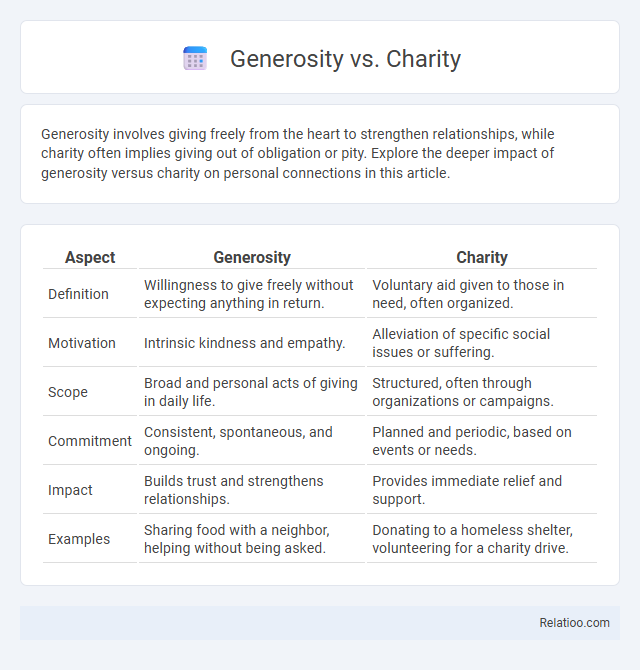Generosity involves giving freely from the heart to strengthen relationships, while charity often implies giving out of obligation or pity. Explore the deeper impact of generosity versus charity on personal connections in this article.
Table of Comparison
| Aspect | Generosity | Charity |
|---|---|---|
| Definition | Willingness to give freely without expecting anything in return. | Voluntary aid given to those in need, often organized. |
| Motivation | Intrinsic kindness and empathy. | Alleviation of specific social issues or suffering. |
| Scope | Broad and personal acts of giving in daily life. | Structured, often through organizations or campaigns. |
| Commitment | Consistent, spontaneous, and ongoing. | Planned and periodic, based on events or needs. |
| Impact | Builds trust and strengthens relationships. | Provides immediate relief and support. |
| Examples | Sharing food with a neighbor, helping without being asked. | Donating to a homeless shelter, volunteering for a charity drive. |
Understanding Generosity and Charity
Generosity involves a genuine willingness to give without expecting anything in return, reflecting a deep sense of empathy and kindness. Charity, on the other hand, often refers to organized efforts to provide aid or relief, usually targeted at specific causes or communities in need. Understanding the distinction helps you cultivate a more heartfelt approach to giving, ensuring your contributions resonate with both compassion and intentional impact.
Defining Generosity: A Broader Perspective
Generosity involves a genuine willingness to give and share resources, time, or kindness without expecting anything in return, reflecting a broader and more intrinsic value compared to charity. Charity typically refers to specific acts of giving to those in need, often driven by social or religious obligations, whereas generosity encompasses ongoing, voluntary gestures that enrich both the giver and the receiver. Your approach to generosity can cultivate deeper connections and a lasting positive impact beyond the transactional nature of charity.
Charity: Acts of Giving with Purpose
Charity embodies acts of giving with purpose, emphasizing intentional contributions to address specific needs or causes. Unlike general generosity, which reflects a broader willingness to share resources or kindness, charity targets structured efforts to improve lives or support communities. Your involvement in charity ensures that your resources create meaningful impact, driving change where it's most needed.
The Key Differences Between Generosity and Charity
Generosity involves a genuine willingness to give without expecting anything in return, often motivated by empathy and compassion, whereas charity typically refers to organized acts of giving, often in response to social or economic needs. Generosity is a personal quality reflecting an individual's kindness, while charity is usually a structured effort, such as donations through nonprofits or humanitarian organizations. Understanding this distinction highlights how generosity can inspire ongoing compassionate behavior beyond formal charitable actions.
Motivations Behind Generosity and Charity
Generosity stems from an intrinsic desire to give without expecting anything in return, often motivated by empathy and a genuine concern for others' well-being. Charity typically involves organized efforts to address specific needs, driven by social responsibility and sometimes tax incentives or community recognition. Understanding these motivations reveals that generosity is more altruistic and personal, while charity is often structured and goal-oriented.
The Social Impact of Generosity vs Charity
Generosity fosters long-term social impact by encouraging a culture of empathy and continuous support, while charity often addresses immediate needs without sustainable change. Your consistent generosity builds community resilience and empowers recipients by promoting dignity and mutual growth. Compared to charity, generous actions create deeper social bonds and lasting positive transformations within society.
Emotional Benefits of Being Generous or Charitable
Generosity and charity both foster emotional well-being by promoting feelings of happiness, fulfillment, and connection. Engaging in acts of giving activates brain regions associated with pleasure and reward, reducing stress and enhancing overall mental health. Generous behavior strengthens social bonds and cultivates empathy, contributing to a more positive emotional state and sustained psychological resilience.
Common Misconceptions About Generosity and Charity
Generosity is often mistaken for charity, yet generosity encompasses a broader, ongoing attitude of giving without expectation, while charity typically refers to specific acts of aid. Common misconceptions confuse generosity with mere monetary donations, overlooking its expression through time, kindness, and resources shared voluntarily. Both generosity and charity aim to support others, but true generosity reflects a deeper, sustained commitment beyond isolated charitable acts.
Cultivating Generosity and Charity in Daily Life
Cultivating generosity and charity in daily life involves actively practicing kindness through consistent acts of giving, whether time, resources, or support to those in need. Your intentional efforts to prioritize generosity foster a culture of empathy and create lasting positive impacts within your community. Emphasizing both generosity and charity enhances personal fulfillment and strengthens social connections.
Generosity vs Charity: Which Makes a Greater Difference?
Generosity involves a selfless spirit and the ongoing willingness to give time, resources, or support without expecting anything in return, fostering long-term positive impact and deeper community connections. Charity, often seen as a one-time act of giving to alleviate immediate needs, addresses urgent issues but may not sustain lasting change. Comparing both, generosity creates a more profound and continuous difference by nurturing relationships and encouraging systemic improvements, whereas charity provides crucial but temporary relief.

Infographic: Generosity vs Charity
 relatioo.com
relatioo.com